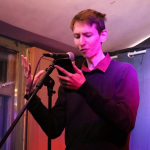 Produced by Guest blogger
Produced by Guest blogger
This is a guest blog by student Sabine Töppig, who has just graduated with a first honours degree in Events Management.
I have just returned from the island Chios in Greece where the annual International Conference of Strategic Innovative Marketing and Tourism (ICSIMAT) was held. The conference chair Androniki (Niki) Kavoura from the University of West Attica in Greece did a stellar job bringing together academics from across the world to discuss their research in the fields of Marketing and Tourism and network.
I attended the conference to present the research I had carried out for my dissertation under the supervision of Dr. Miguel Moital, but soon after arriving noticed that this experience would entail so much more than that. I received the warmest welcome and quickly got to know many of the scholars attending the conference who approached me to hear about BU and its Tourism, Hospitality & Events area which has an excellent reputation. Prof. Buhalis, who is on the advisory board of the conference, was frequently mentioned to me and spoken of in the highest possible terms. Soon after arriving at the conference, I felt part of the ICSIMAT community, which is outstandingly friendly and supportive. I met amazing people from across the globe and enjoyed exploring the island with them.

The conference was opened by Anthony Gortzis, president of the European Business Ethics Network, who made an inspiring speech about Ethics. The academic programme entailed several presentations on industry success stories as well as over 140 paper presentations, covering a wide range of subject areas within Tourism and Marketing, such as sustainability, development, innovation, strategy and communication. My presentation was part of the session on Entrepreneurship and Innovation in organisations, companies and countries, and the supportive environment at the conference made me feel at ease about presenting in front of an academic audience.
My presentation was entitled “An exploration of the techniques, outputs and outcomes of circulation management at exhibitions”. During my placement I understood that attendee circulation determines whom and what they see and interact with at an exhibition. To establish how and why exhibition managers manage circulation, I sought to explore the techniques, outputs and outcomes of circulation management. Based on interviewing 10 exhibition managers, my study identified four types of techniques, five outputs and a variety of outcomes benefitting three stakeholders: organiser, exhibitor and attendee. Besides establishing the techniques, outputs and outcomes of circulation management, my study uncovered a large range of factors influencing the employment of circulation management techniques. The research also highlights the conflicts in outputs resulting from several techniques, and that exhibition managers, therefore, need to establish which outputs and resulting outcomes take priority over others.

Of course, if you work hard, you can play hard, and the social programme of the conference reflected a brilliant balance. It started with a trip around the island of Chios, which has an immense amount of cultural heritage. We visited Nea Moni, a picturesque 11th-century monastery which is a UNESCO World Heritage Site, before learning about Chios‘ history in cultivating and distributing citrus fruits at the Citrus Museum.

At the Mastic museum, we were able to try Mastic, a predecessor of chewing gum and a popular sweet and which, in this form, can only be cultivated in Chios. I found out that it resembles Marmite – you either love it or you hate it! We also visited the beautiful Mastic village of Mesta and Pyrgi, the ‘painted village‘, which is distinct due to the black and white decorations carved into the facades.

On the last day of the conference, we were taken on a boat trip to the beautiful island of Oinousses, which offers amazing views, stunning architecture and a peaceful atmosphere.

Overall, ICSIMAT stands out as a conference because of the amazing community of friendly and supportive academics who make everyone feel welcome, the interesting content from which I could learn so much, and the brilliant social programme.

I would like to thank the Department of Events & Leisure within the Faculty of Management for the opportunity to attend an international conference and present my research to the academic community.
 Working and living in New York as a BU graduate
Working and living in New York as a BU graduate My placement year with Pacific Asia Travel Association
My placement year with Pacific Asia Travel Association Bourne to progress, my placement story
Bourne to progress, my placement story My Story So Far – The Beginning of a Journey
My Story So Far – The Beginning of a Journey








